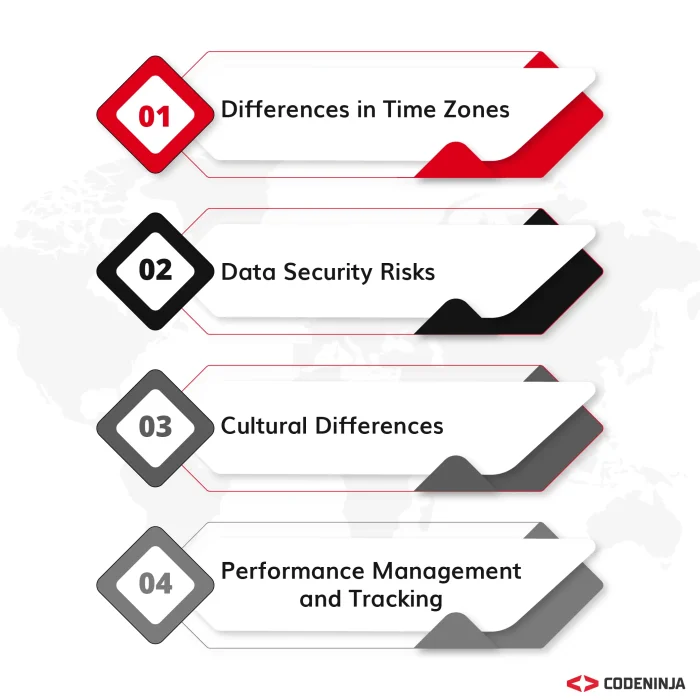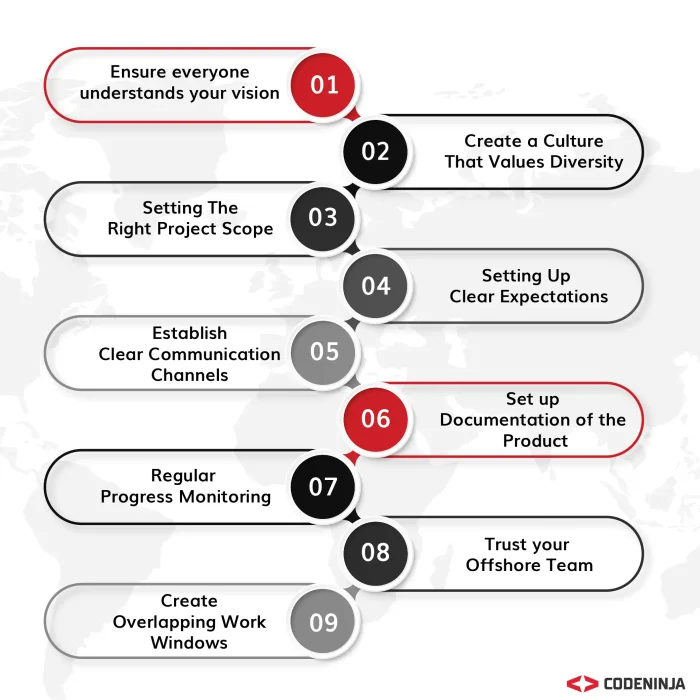Best Practices To Overcome The Challenges in Managing Offshore Teams
4 August, 2023
In the fields of IT, programming, and software development, offshoring is a rapidly growing segment. It is driven by the advantages of offshoring, such as cost reduction, access to global talent, flexibility, and faster.
In 2021, the market for offshore software development was estimated to be worth USD 122,257.5 million. By 2030, it is expected to be worth USD 283,457.5 million, rising at a CAGR of 10.13%.
Nevertheless, manage offshore teams is more challenging than managing in-house or internal teams.
According to SharpMinds, countries like India (44%), China (33%), Brazil (10%), and Eastern Europe (5%) dominate the market. Whether you run a startup or an established business, bringing in an offshore team can help you reach your organizational objectives and grow your company.
In this blog, we’ll cover what is an offshore team is and how to manage an offshore development team effectively. We’ll also share the best practices, tips, and best tools to managing offshore teams.
What is an Offshore Team?
The term “offshore team” refers to the selection of a team of experts from regions remote from your company headquarters. Due to a significant time difference, the team may work in a separate time zone. Or, if necessary, they would modify their shift to meet your needs.
For instance, the Philippines serves as a focal point for offshore development for clients from the US and other nations.
However, the term ‘offshoring’ should not be confused with “outsourcing”.
Outsourcing entails that the staff from another company handles and manages some of your company’s operational needs and business processes. Whereas in offshoring, your business employs an offshore team, but they simply don’t work in the same office as your company. They’re located offshore.
Pro Tip:
Majority of the offshore software development companies are based in countries where the cost of living is low and currency exchange rates are favorable. This serves as a business opportunity for tech firms to save costs.
Key Benefits of Managing Offshore Development Teams
There are several advantages of offshore teams. Once a business decides to offshore, it is able to build an experienced team by working with offshore teams. It often results in attracting a variety of expertise that would not have been available locally.
As a business owner, by offshoring software development, you can cut development costs. Moreover, you can concentrate on other crucial business aspects like marketing or product promotion.
Given below are the advantages that accompany you when you decide to managing offshore teams effectively.

● Increase in Profitability
Hiring an offshore development team helps businesses cut their costs. In the long run, this improves the overall profitability of the business. It is very important to ensure that the remote offshore team is well-matched to your company.
● Access to highly skilled talent
It can be challenging to locate local workers or a trustworthy company in your location that can complete the development tasks you require for a reasonable price. With offshoring, you can access a large talent pool with the required expertise that may not be available locally.
● Increase in Capacity
Your work capacity and growth will be enhanced by having a dedicated team in another country because they have the skills and scalability needed for business success.
● More Time to Concentrate on Your Main Business
With an offshore team managing your development, you’ll have more time to dedicate to the important job that has been pushed off, such as product marketing. There will be more time to devote to your primary business since your firm will be well-cared for, freeing you up from having to deal with issues in a field you’ve never worked in.
Challenges in Managing Offshore Development Team
When it comes to a business to manage offshore teams, finding the right offshore team is only half of the work. The other half is knowing how to manage them.
The following is a list of potential challenges to managing an offshore teams you could face along with solutions

● Differences in Time Zones
Communication lags brought on by being in separate time zones can have a negative impact on project schedules.
To counter this, you can work with your local, dedicated development team to hire offshore workers in a time zone that is comparable to yours, such as those with a maximum time difference of 4-5 hours.
This will help achieve some overlapping hours, and reduce communication lags.
● Data Security Risks
Your company’s data may be at risk when you give your offshore team access to it.
To counter this, you can set up a local database and permit everyone on your team to access it to keep your data secure. In this way, you have complete control over your database, including software security and backups.
Pro Tip: To track remote employee adherence to corporate security requirements, you can think about implementing software like Insightful, and Teramind.
● Cultural Differences
Working with offshore teams in different locations means having people from different backgrounds and cultures. This brings up the challenge of cultural differences and communication barriers among the team members.
You must make sure that your internal team is aware that they will be working with a diverse team. What is considered professional communication and work practices may differ according to people in other nations.
Pro Tip: Make sure your teams speak at least one language in common to prevent this language and communication barrier.
● Performance Management and Tracking
Monitoring performance is a big challenge with remote team management.
Team performance evaluation is a crucial element in ensuring business profitability.
Fortunately, there are several types of time-tracking tools available to assist you in monitoring the billable hours and output of your offshore team.
Pro Tip: Set measurable goals, provide timely feedback, and conduct performance evaluations to identify areas of improvement and recognize achievements.
How To Manage Offshore Software Development Team Effectively
The 2021 State of Remote Report shows that communication and collaboration were one of the biggest challenges in remote operations.
Thus establishing standard communication channels is crucial for managing offshore development teams. It allows teams to exchange their ideas, input, and feedback seamlessly.
However, there’s more when it comes to offshore team management. We’ve listed down the best practices for managing offshore teams and tips to managing offshore resources.
Best Ways To Manage Offshore Teams - Best Practices For Offshore Team Management

Ensure everyone understands your vision
The decision to offshore software development impacts the entire company, not just the top management. Therefore, it is important to ensure that everyone in the company is fully committed to the task.
In order to get everyone’s support, effective communication is key. This involves explaining the reasons behind the decision to offshore, highlighting the potential growth and business opportunities it can bring to the company, and reassuring employees that their jobs will not be negatively affected.
Additionally, educating in-house resources on how offshore teams can improve their work environment, reduce workloads, and empower them to excel is crucial for a seamless transition and future operational success.
Create a Culture That Values Diversity
When collaborating with offshore development teams, it’s important to address cultural differences to avoid miscommunication and conflicts.
To manage offshore development effectively, create a culture that embraces and appreciates the diversity of your offshore team.
Tips to build an inclusive culture:
- Implementing cultural awareness programs and training for both internal and offshore teams to educate them about each other.
- Treat offshore teams as integral parts of the organization
- Encourage inclusion in celebrations
- Promote open communication and equal growth opportunities
- Provide a safe environment for sharing ideas
- Educate both parties on company guidelines.
Effective leadership is important to building a diverse and inclusive culture by promoting regular interaction, resolving cultural misunderstandings, and building cohesive cross-functional teams.
Ultimately, establishing a sense of belonging is crucial when working with offshore resources.
Setting the Right Project Scope
Before choosing to recruit an offshore team, it is important to define the project’s scope, create an outline, and decide on your long-term objectives with the team.
Whether it is a one-time initiative or a long-term addition to your company model, as a business, you must have a clear grasp of the type of relationship you want to develop.
Setting Up Clear Expectations
For managing an offshore team, it is important to establish and communicate clear expectations. Without a defined plan of action, the staff will work blindly and follow instructions, defeating the entire purpose of bringing in specialists.
Tips to set clear expectations:
- Goals and objectives should be communicated. You and your offshore team should agree on the project’s goals and objectives. They ought to be aware of the goal and intended outcome of the project.
- Establish roles and responsibilities: Each team member has to be aware of their specific duties. To do this, it may be necessary to list the duties and due dates assigned to each team member.
- Establish deadlines and benchmarks: Establish deadlines and break the project into smaller, more manageable milestones to keep the team on track and on schedule.
Establish Clear Communication Channels
To enable a smooth exchange of ideas, information, and feedback, standard communication routes must be established.
In-house and offshore teams will work together more effectively when there are clear communication channels in place to ensure accurate documentation, prevent knowledge gaps, and align teams.
Set up Documentation of the Product
Comprehensive documentation is crucial for managing technical debt and ensuring future-proof software products. It enables the effective resolution of hidden dependencies and suboptimal solutions within the code.
Regular Progress Monitoring
Implement a project management system, such as Trello or Jira, to track progress, assign tasks, and monitor deadlines. Regularly review project status and hold progress update meetings to stay informed about the development process.
Trust your Offshore Team
A skilled and cost-effective offshore team can help create a competitive edge and effectively deliver products, despite the fact that it could seem like a lot of work for little reward.
Once clear expectations have been set, and communication channels established, it’s important to trust your offshore team. They are your partners. And you must consider them as a team who is aiming towards the same goal as you.
Without mutual understanding and trust, continuing the offshore relationship would be pointless.
Create Overlapping Work Windows
It’s critical to handle the time zone difference with your offshore workforce to prevent management problems. Expecting availability 24/7 is unrealistic; nevertheless, overlapping work times for team tasks can be helpful.
Pro Tip:
Let the team know in advance about meetings and deadlines that fall inside your time zone and be considerate when communicating with them both during and after working hours.
Tools For Managing Offshore Software Development Teams Successfully
Are you wondering how to successfully manage your offshore team?
Here are some tools that help in managing offshore development teams effectively:

● Asana:
It is a project management tool that facilitates the effective management of offshore development teams. It enables task assignment, progress tracking, and team collaboration across different time zones, ensuring efficient communication and coordination
● Slack:
It is a cloud-based online messaging platform that can be used to effectively manage an offshore development team. It enables real-time communication, direct messaging, group chat, file sharing, and integration with other tools.
● Monday:
It is a project management platform that can effectively managing an offshore development team. It offers features such as task tracking, collaboration tools, and progress monitoring.
● Zoom:
It is a video conferencing platform that allows face-to-face conversations with features such as HD video, audio, and screen sharing. Team members can hold virtual meetings, discuss project updates, and engage in interactive discussions, facilitating effective communication and coordination with the offshore development team.
● Microsoft Teams:
It is a collaboration platform offering chat, video conferencing, file sharing, and project management tools. It is widely used by businesses leveraging Microsoft Office 365.
With Microsoft Teams, the teams can communicate, collaborate, and coordinate their work, enhancing productivity and streamlining project management within the team.
● Trello:
A popular project management tool with boards, lists, and cards to track tasks. It is ideal for monitoring the progress of multiple projects simultaneously. The teams can assign and organize tasks, track their status, and collaborate in real time, ensuring effective task management and seamless coordination within the team.
Conclusion
Hiring offshore developers can provide a competitive edge and cost-effective delivery of software products. However, there may also be challenges when it comes to managing offshore development teams.
It’s important to hire competent and reliable offshore developers.
Once the hiring is done the right way, the advantages often outweigh the disadvantages of offshore teams.
.jpg&w=256&q=75)
Zobaria Asma
Asst. Manager Brand & Communications
Zobaria serves as the Asst. Manager Brand & Communications at CodeNinja, driving brand strategy and communication efforts across diverse global markets, including APAC, LATAM, and MENA. With over 5 years of experience in scaling businesses, she brings expertise in SaaS branding and positioning. Her expertise spans a range of sectors, ensuring that CodeNinja's messaging resonates with diverse audiences while reinforcing its leadership in hybrid intelligence, AI-driven innovation, and digital transformation.
